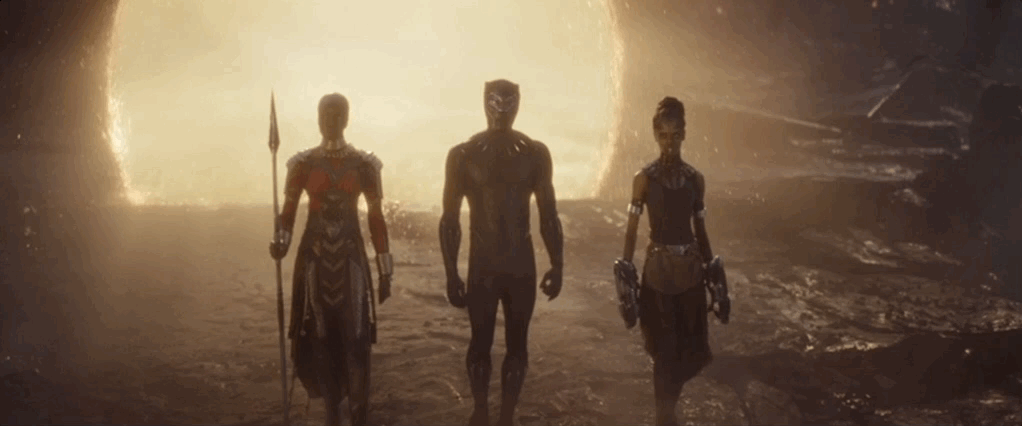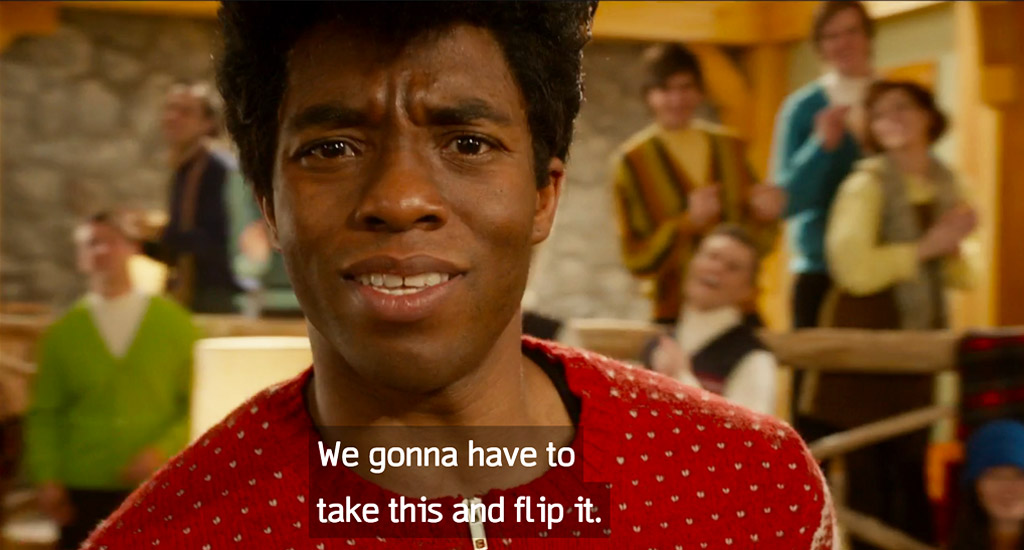“To be Young, Gifted, and Black,” Black Panther star Chadwick Boseman declared at the 2019 SAG Awards while referencing Nina Simone’s 1969 song. “We all know what it’s like to be told that there is not a place for you to be featured. We knew that we had something special that we wanted to give to the world. That we could be full human beings in the roles we were playing.”
Boseman, of course, was speaking on behalf of an entire Marvel Cinematic Universe ensemble cast. Together, they had unveiled the fictional African nation of Wakanda to the world as a celebration of Black culture in the Ryan Coogler-directed movie that churned up $1 billion at the box office. For Boseman, the role of King T’Challa now marks the apex of an incredible legacy for the 43-year-old actor struck down by cancer only a few days ago. His words found powerful resonance regarding Black Panther — which arrived at a time when the U.S. began to feel increasingly divided by racism and xenophobia — yet Boseman always had a flair for not only playing “full human beings” but also downright iconic ones, pulled from the pages of history.
We’ll talk about those roles soon, but it’s worth noting that Da 5 Bloods director Spike Lee has revealed that he never suspected that anything was amiss with Boseman’s health. He apparently shielded virtually everyone from news of his Stage 3 diagnosis in 2016. That’s the same year that he surfaced as T’Challa in Captain America: Civil War, and he kept on superhero-ing through Avengers: Endgame. I must mention here that Endgame featured Boseman in my most indelible recent theatergoing memory, one that makes me (like our own Brian Grubb) miss movie theaters even more than I did last week.
It already feels like forever ago, but Endgame can fairly be described as the last real “event movie” we’ve seen. Theaters were packed while everyone awaited the gathering of superheros against Thanos. A year had passed since Infinity War, which left T’Challa and Peter Parker fans feeling particularly shredded. The demise of either character seemed unfathomable, and Marvel redelivered them at the perfect moment. As a hush fell over the theater, Captain America turned to see the Wakandan heroes as the first to emerge through the portal. As soon as T’Challa popped back onscreen, a woman in my theater shouted, “My boo!” That was followed by the loudest chorus of theater-bound shouts and cheers (“Wakanda Forever!”) that I’ve heard in many years.

It was a wonderful communal moment. I don’t know whether we’ll see one like it again, pandemic or not. Whenever Black Widow finally arrives in theaters, and people see the Taskmaster mimicking the king’s signature gesture, well, that’s going to feel bittersweet. Beyond that, I do believe that there can be no recasting of T’Challa. Boseman’s legacy is so tied to that role that replacing him feels virtually impossible. Further, the startling news of his death has found extra resonance from the day that he died. Not only was last Friday the anniversary of the 1963 March on Washington, but it was also Jackie Robinson Day. On that note, let’s move onto the roles — Robinson, James Brown, and Thurgood Marshall — that made Boseman a superhero of starring in historical biopics.
Jackie Robinson in 42 (2013)

Boseman struck a careful balance here, much like the icon he played. As the first African-American Major League baseball player, Robinson was tasked with having “the guts not to react” to the racist taunts that plagued his first season with the Brooklyn Dodgers. Even while playing a character forced to be stoic, though, Boseman allowed Robinson’s warmth to shine through at choice moments, and at one point, he was even able to let all of his character’s frustrations hang out, by himself, off-field. And I did grow misty over Boseman’s reaction when (as shown above) Pee Wee Reese (Lucas Black) tells Robinson, “Maybe tomorrow we’ll all wear 42, that way they can’t tell us apart.”
Looking back, it’s evident from this performance that Boseman himself was destined for superstardom and heroism, much like Robinson, who found himself surprised to not only be a ballplayer but a hero to Black children everywhere. Every single moment that Boseman shares onscreen with Harrison Ford (as Dodgers GM Branch Rickey) showcases the teaming of two pioneering greats, who came together to chip away at racial prejudice in the U.S. It’s ultimately an uplifting story, full of courage and endurance and entertainment value. Such a fine-tuned performance of inner struggle would have been lost upon an actor without as much depth as Boseman always brought to the table.
James Brown in Get On Up (2014)

Boseman turned in an intoxicating performance of an electrifying performer with all the dark humor that the role required. From Brown’s double-take at finding himself at a “honky hoedown” to his refusal to be “just the show” while letting the “white Devil” take charge of his business, this was an expansive performance that also included Brown’s later run-ins with the law. All of these shades were necessary to form a “full human” (to borrow Boseman’s words) during his portrayal of the Godfather of Soul, including superstardom and the mayhem that followed. And what a challenge it must have been to portray this larger-than-life juggernaut without overshadowing a musical legacy.
The most striking scene in this film, however, takes place in the immediate aftermath of Martin Luther King Jr.’s 1968 assassination. Boseman presided over Brown’s live Boston Garden audience in a guardian-like way, diffusing what could have become a dangerous situation, given that the police officers manning the venue were edging toward brutality toward people who wished to join Brown onstage. It was a commanding performance that showcased all of Brown’s humanity, as well as his insistence that both public officials and the audience show respect for him and each other during a time of great upheaval. One also has to respect the whip-smart air demonstrated by Boseman as Brown changed a game “where the rules have already been set.”
Thurgood Marshall in Marshall (2017)

Boseman took an MCU breather to step into the early life of the first African-American justice of the U.S. Supreme Court. It’s a streamlined chapter that focuses on Thurgood Marshall’s defense of a wrongfully accused Black defendant, Joseph Spell, against charges of rape and attempted murder. The film’s bolstered by fine performances by Sterling K. Brown, Kate Hudson, and (yes, even) Josh Gad, all of whom infused a 75-year-old case with contemporary relevance. Anchoring them all, however, is Boseman, whose character is forced to take a backseat in court proceedings when the judge wouldn’t let him speak in open court. It’s an important chapter in Marshall’s career, particularly because, even back then, he saw the big picture, and Boseman’s self-assured performance finds particular resonance while declaring, “My jury is not just 12 people in the box, it’s the whole nation.”
Thurgood is the perfect film to revisit while reflecting upon a recent Instagram post from Boseman, who reflected upon this year’s Black Lives Matter protests while sharing a New Yorker cover about George Floyd and writing, “From this country’s founding history; its economic base, its social standard, its penal system, its protection of property… White Supremacy and Racial Prejudice are its Pre-existing Conditions.”
This was also a decidedly unflashy, meticulous performance of a civil rights icon. As Marshall, Boseman reminded modern audiences that, yes, defendants and suspects were often (and still are) treated differently because of their race. We see that even in 2020, as Kenosha police treated a white vigilante teen murderer better than Jacob Blake, and Boseman’s undertaking of this role (while ill) underscores his commitment to reminding audiences that, yes, he’s always been committed to using his platform to shine a light on how racial injustice in the U.S. isn’t truly a thing of the past.
Boseman’s commitment to using his talent to showcase his messages couldn’t be more evident than his eventual rise as King T’Challa in Black Panther. Audiences embraced him in that role, at least in part, because he built a sturdy foundation through his telling of historical biopics. He sought out roles that fostered the transformation that he wanted to bring to the world. In that way, Boseman really did become the real-life superhero of playing iconic figures. While reflecting on Boseman’s performances in these roles, I couldn’t put it better than CBS Sports Managing Editor Adi Joseph, who recently observed of Boseman, “Someday, someone will get to play him.”







